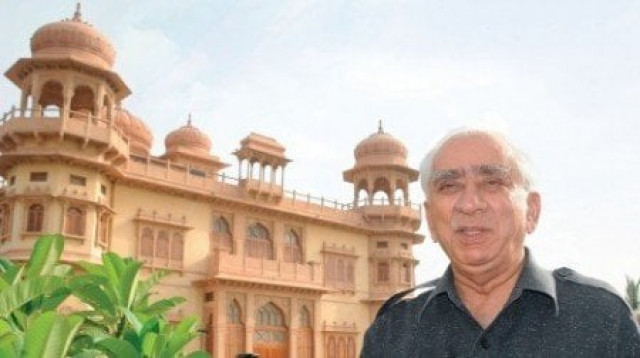Singh ‘Jas want’s us to look into the past for future peace

Discussing his book with The Express Tribune, Singh said that he didn’t write the book because he “was fascinated with Jinnah” but rather he was looking at “why we divided”. Stressing on the importance of understanding of understanding the partition, Singh said that the people of both countries need answers and can’t be content unless partition and the problems which it caused are answered.“I was really pursuing the consequences and causes of partition. We must first address the [former],” he said.
Partition and childhood
His next book, Call to Honor, contains vivid details about what partition meant to him during the early years of his life.
“We lived here next door near Sindh,” Singh went on say. “To us, Sindh was another home. My wife still says that she used to come to Karachi with the Maharaja of Jodhpur. This is where they came for holidays and shopping.”
Singh opined that the bonds between Indian and Pakistan are emotionally intertwined because “our linkages are cultural and ancient”. Indo-Pak relations “India, Pakistan relations are given to unpredictable fractures. Every now and then there is a strain in our relations,” Singh.
Yet, he remains hopeful. “We must pursue the path of peace relentlessly because there is no other option to peace. There’s a Punjabi saying which is dear to my heart, Rona we sanja tae hansa we sanjha. We cry together, we laugh together.”
Advising peoples of both countries to demand peace, Singh said that “[even] if the governments fail the people, the people themselves must not fail themselves. Expand the constituency of peace and pursue it.”
Kashmir
“The only way to move forward on the issue of Kashmir is through negotiations and talks between the two countries.”
Shoaib and Sania
Commenting on the Shoaib Malik-Sania Mirza wedding, Singh said that cross-border weddings were old and common. “But we forget that the common people suffer a lot when they marry [because of visa restrictions]. Shoaib faced no problems with the visa and hopefully Sania won’t either, but what about the common people? For how long will they suffer for a simple thing such as a visa? “
Western powers, Af-Pak
“The US and the Western powers have their own vested interests. We must think beyond them. We, India and Pakistan, have to solve problems on our own,” Singh said.
“The Western powers have coined the term Af-Pak, which distresses me deeply. How can the Americans decide our fates sitting more than 8,000 miles away, while the distance between our countries is just eight and a half minutes. Pakistan, Afghanistan and India, all three will have to find a solution to the problems in Afghanistan.”
He said that when his American friends asked him what should be done in Afghanistan, he urged them to try what Zahir Shah had done there in the past. Singh received a standing ovation from his audience. When he said, “I’m a soldier in the service of India and I’ll do anything to ensure peace [with] my neighbors,” the audience responded with resounding applause.
Gandhi, Jinnah and the future
“We, India and Pakistan, are born of the same womb. It was not a natural birth, it was a caesarian. But we are linked by birth and [we should] recognise it,” Jaswant said. Commenting on the difference between Jinnah and Gandhi , he said that “Gandhi brought religion into politics. This is the reality.” Singh ended his lecture with the following words: “Our past is not our past. Our past becomes the present. Unless we get rid of the shadows of our history, peace will continue to elude us.”



















COMMENTS
Comments are moderated and generally will be posted if they are on-topic and not abusive.
For more information, please see our Comments FAQ